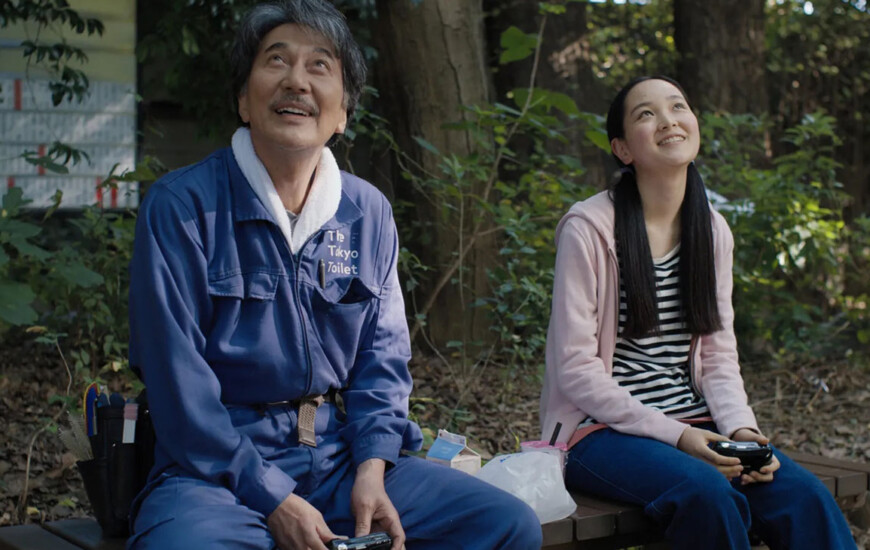Perfect Days is a soulful treat
Mike Finnerty 20 Feb 2024
German director Wim Wenders is the master of creating films that let you sit in the moment and let the feeling wash over you.
From his seminal New German Cinema work, the landmark film Paris, Texas to his music video work with U2, Wenders is a contender for the greatest filmmaker Europe has ever produced.
Wenders understands mood and atmosphere the same way Hitchcock understands suspense and tension.
With this new film Perfect Days, Wenders achieves the near-impossible in making one of his best films over 50 years into his career.
Perfect Days tells the story of Hirayama, a toilet cleaner in Tokyo.
He lives a modest life; he lives frugally, diligently waters his plants every day, trims his moustache to be an exact length and likes to listen to old rock music on cassette tapes on the drive to work.
We follow Hirayama through his daily routine and leading man Koji Yakusho blesses the film with a quiet dignity.
In the hands of a lesser filmmaker and actor, Perfect Days would be dull and monotonous; Wenders and Hashimoto are perfectly in sync and manage to create poetry in film form.
Perfect Days is similar to Jim Jarmusch’s 2016 film Paterson which explored the daily life of Adam Driver as a bus driver in New Jersey who happens to enjoy poetry, and the films would make for a great double feature.
Hashimoto’s performance is similar to Adam Driver; there is a quiet determination and understatedness that powers them.
Understated is the one-word descriptor we would use to describe Perfect Days, and it is a masterclass in subtlety and nuance.
What Perfect Days does so brilliantly is telling a story without words.
Despite the film being in Japanese, there are long stretches of the film that are dialogue-free and you are invited to vibe with the characters and drink in the atmosphere.
It is the sign of a well-made film that you can watch it with the sound off, and Perfect Days sometimes feels like an experiential film.
The film’s plot takes the form of a series of vignettes showing a day in the life of Hirayama as he scrubs the toilets of Tokyo, helps a young co-worker with his love life, visits his local book shop, enjoys a post-work drink or does his washing.
Describing the events of Perfect Days makes it sound monotonous and repetitive, but in that classic Wim Wenders style it flows like poetry.
Hirayama picks out a certain classic rock cassette to listen to on his daily commute, and in those scenes, the songs become a character.
While we won’t spoil the exact songs played in the film, Perfect Days makes perfect use of music in a way that would make Jonathan Demme or Sofia Coppola proud.
Despite taking place in Tokyo, Perfect Days could take place in any city in the world.
There very easily could have been a version of the film set in Dublin, or a version of the film set in Buenos Aires.
Wenders manages to get across the feeling that despite being set in Tokyo, a city with a population three times the size of Ireland, it is possible to feel anonymous and non-descript in a city of millions.
Hirayama is just another unseen cog in the machine that keeps Tokyo going.
In one early scene, Hirayama’s co-worker remarks that he puts too much effort into cleaning the toilets when they will only become dirty again.
Hirayama shrugs him off and proceeds with his work in a diligent and attention to detail that tells the viewer he has pride in his work, and if he makes one person’s day better then he has done his job well.
Perfect Days manages to thread the needle between being a universal film that anyone can enjoy, yet it is elusive enough to make it stand out from the crowd.
For people who think that filmmaking has become too franchise-focused and doesn’t focus enough on humanity, Perfect Days is the film that reaffirms your faith in the art form.
Perfect Days contains multitudes; it is deeply personal but anyone can relate to it and it is just as funny as it is bittersweet.
The film has become notable for becoming the first-ever Japanese film to be Oscar-nominated for Best International Feature despite not being directed by a Japanese filmmaker.
That statistic is a testament to the genius of Wenders.
Even when the script isn’t in his native German or English, there is still a beauty and poise to the film that naturally shines through.
Regardless if you see this film with a crowd or when it arrives on Mubi, Perfect Days is a film that people from all walks of life can cherish.











